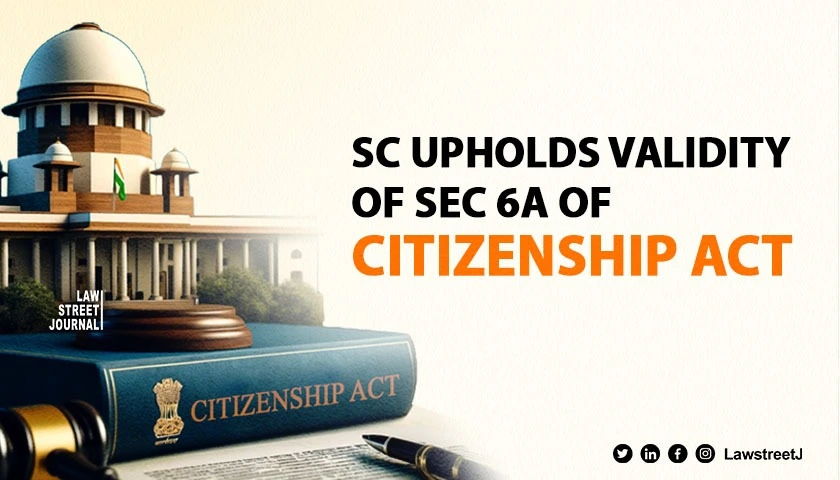NEW DELHI: The Supreme Court on Thursday upheld the constitutional validity of Section 6A of the Citizenship Act, 1955, brought in after the signing of the Assam accord on August 15, 1985.
SC Validates Citizenship Provisions Under Section 6A for Pre-1971 Immigrants in Assam
Section 6A granted citizenship to all immigrants who entered Assam from Bangladesh before January 1, 1966. Further, immigrants who entered Assam between January 1, 1966 and March 24, 1971 were considered as Indian citizens without voting privileges for 10 years.
By a majority view of 4:1, a Constitution bench of Chief Justice DY Chandrachud, and Justices Surya Kant, M M Sundresh, J B Pardiwala and Manoj Misra, rejected a challenge to the legal provision.
Majority Judgment Affirms Legislative Solution to Assam’s Illegal Migration Issue Post-Bangladesh War
The CJI said the objective of the provision must be understood in the backdrop of the Post-Bangladesh War.
He said that the Assam Accord was a political solution to the problem of illegal migration and Section 6A was the legislative solution.
Reading out the parts of the judgment, he held that Section 6A was enacted to balance the humanitarian concerns with the need to protect the local population.
CJI Chandrachud also said Section 6A of the Citizenship Act confers citizenship on those who migrated from Bangladesh to Assam until March 24, 1971, and Article 6 and proviso to Article 7 confers citizens on a limited class.
“Section 6A deals with those who are not covered by constitutional provision, that is those who migrated after July 26, 1949," the bench noted.
He also said Section 6A enactment was a political solution to a unique problem faced by Assam due to the massive influx of illegal migrants into the state after the creation of Bangladesh, which had threatened its culture and demography.
The court’s ruling would apply to immigrants who came after March 25, 1971.
The court noted that the Centre could have extended the act to other areas as well, but did not do so because it was unique to Assam.
In a concurring view, Justice Surya Kant, along with Justices Sundresh and Mishra, said Parliament had legislative powers to lay down the conditions under Section 6A and that cannot be controlled.
Justice Surya Kant rejected contention by the petitioners that Section 6A suffered from manifest arbitrariness, was against the principle of Fraternity, and caused external aggression or internal disturbances.
He also held the provision does not suffer from the vice of vagueness.
In fact, the provision provided for detection and deportation of illegal immigrants, he said.
Parliament was conversant with all facts of the situation in enacting the provision, he said.
International law can't trump domestic laws, he said, holding Section 6A is constitutionally valid and it is a valid piece of legislation.
Justice J B Pardiwala, however, dissented with the majority view. He said the influx illegal immigrants has not abated since the accord.
Owing to its inherent problem, it has resulted into influx of illegal immigrants, he said, declaring the provision as unconstitutional.
The court asked the Centre and state government to effectively implement directions in Sarbananda Sonowal judgments for identification, detection and deportation of illegal Bangladeshi immigrants.
Also Read : SC declines to stay Citizenship Amendment Act
The majority judgment by Justice Kant said SC will from now onwards monitor this identification and deportation process.
The majority judgment by Justice Kant declared that those who have entered Assam from Bangladesh on or after march 25, 1971 are all illegal immigrants, who must be identified, detected and deported.
It also said Section 6A came be enacted only for Assam and not applied to West Bengal, Meghalaya and Mizoram which too faced influx of Bangaldeshi migrants, since the problem of Assam was more severe. Hence the government could act to address the situation there, it added.
The apex court had reserved the judgment in the matter on December 12, 2023.
The provision was inserted into the Act in December 1985 in furtherance of the Assam Accord. The Assam Accord was an agreement between the Union government and the All Assam Students Union (AASU) and the All Assam Gana Sangram Parishad (AAGSP).
The Assam group raised agitation against an influx of Bangladeshi-immigrants after Bangladesh, then known as East Pakistan, separated from West Pakistan on March 26, 1971. Section 6A was added to the Citizenship Act to assuage AASU and AAGSP’s concerns and identify and expel foreign immigrants who entered Assam after March 25, 1971

















